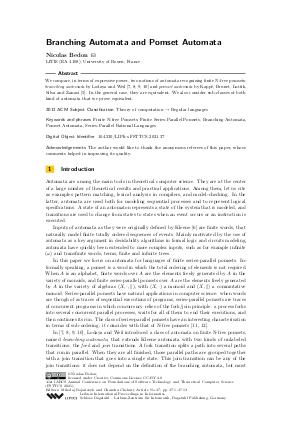Branching Automata and Pomset Automata
Author Nicolas Bedon
-
Part of:
Volume:
41st IARCS Annual Conference on Foundations of Software Technology and Theoretical Computer Science (FSTTCS 2021)
Part of: Series: Leibniz International Proceedings in Informatics (LIPIcs)
Part of: Conference: IARCS Annual Conference on Foundations of Software Technology and Theoretical Computer Science (FSTTCS) - License:
 Creative Commons Attribution 4.0 International license
Creative Commons Attribution 4.0 International license
- Publication Date: 2021-11-29
File

PDF
LIPIcs.FSTTCS.2021.37.pdf
- Filesize: 0.64 MB
- 13 pages
Document Identifiers
Subject Classification
ACM Subject Classification
- Theory of computation → Regular languages
Keywords
- Finite N-free Pomsets
- Finite Series-Parallel Pomsets
- Branching Automata
- Pomset Automata
- Series-Parallel Rational Languages
Metrics
- Access Statistics
-
Total Accesses (updated on a weekly basis)
0Document
0Metadata
Abstract
We compare, in terms of expressive power, two notions of automata recognizing finite N-free pomsets: branching automata by Lodaya and Weil [Lodaya and Weil, 1998; Lodaya and Weil, 1998; Lodaya and Weil, 2000; Lodaya and Weil, 2001] and pomset automata by Kappé, Brunet, Luttik, Silva and Zanasi [Kappé et al., 2018]. In the general case, they are equivalent. We also consider sub-classes of both kind of automata that we prove equivalent.
Cite As Get BibTex
Nicolas Bedon. Branching Automata and Pomset Automata. In 41st IARCS Annual Conference on Foundations of Software Technology and Theoretical Computer Science (FSTTCS 2021). Leibniz International Proceedings in Informatics (LIPIcs), Volume 213, pp. 37:1-37:13, Schloss Dagstuhl – Leibniz-Zentrum für Informatik (2021)
https://doi.org/10.4230/LIPIcs.FSTTCS.2021.37
BibTex
@InProceedings{bedon:LIPIcs.FSTTCS.2021.37,
author = {Bedon, Nicolas},
title = {{Branching Automata and Pomset Automata}},
booktitle = {41st IARCS Annual Conference on Foundations of Software Technology and Theoretical Computer Science (FSTTCS 2021)},
pages = {37:1--37:13},
series = {Leibniz International Proceedings in Informatics (LIPIcs)},
ISBN = {978-3-95977-215-0},
ISSN = {1868-8969},
year = {2021},
volume = {213},
editor = {Boja\'{n}czyk, Miko{\l}aj and Chekuri, Chandra},
publisher = {Schloss Dagstuhl -- Leibniz-Zentrum f{\"u}r Informatik},
address = {Dagstuhl, Germany},
URL = {https://drops.dagstuhl.de/entities/document/10.4230/LIPIcs.FSTTCS.2021.37},
URN = {urn:nbn:de:0030-drops-155486},
doi = {10.4230/LIPIcs.FSTTCS.2021.37},
annote = {Keywords: Finite N-free Pomsets, Finite Series-Parallel Pomsets, Branching Automata, Pomset Automata, Series-Parallel Rational Languages}
}
Author Details
Acknowledgements
The author would like to thank the anonymous referees of this paper, whose comments helped in improving its quality.
References
-
Nicolas Bedon. Logic and branching automata. Logical Methods in Computer Sciences, 11(4:2):1-38, October 2015.

- Jay L. Gischer. The equational theory of pomsets. Theoret. Comput. Sci., 61(2):199-224, 1988. URL: https://doi.org/10.1016/0304-3975(88)90124-7.
-
Jan Grabowski. On partial languages. Fundam. Inform., 4(1):427-498, 1981.

-
Tobias Kappé, Paul Brunet, Bas Luttik, Alexandra Silva, and Fabio Zanasi. Brzozowski goes concurrent - A Kleene theorem for pomset languages. In Proc. CONCUR 2017: 28th International Conference on Concurrency Theory, volume 28, pages 21:1-21:15, January 2017.

- Tobias Kappé, Paul Brunet, Bas Luttik, Alexandra Silva, and Fabio Zanasi. On series-parallel pomset languages: Rationality, context-freeness and automata. Journal of Logical and Algebraic Methods in Programming, 103, December 2018. URL: https://doi.org/10.1016/j.jlamp.2018.12.001.
-
Stephen C. Kleene. Representation of events in nerve nets and finite automata. In Shannon and McCarthy, editors, Automata studies, pages 3-41, Princeton, New Jersey, 1956. Princeton University Press.

-
Kamal Lodaya and Pascal Weil. A Kleene iteration for parallelism. In V. Arvind and R. Ramanujam, editors, Foundations of Software Technology and Theoretical Computer Science, volume 1530 of Lect. Notes in Comput. Sci., pages 355-367. Springer-Verlag, 1998.

-
Kamal Lodaya and Pascal Weil. Series-parallel posets: algebra, automata and languages. In M. Morvan, Ch. Meinel, and D. Krob, editors, STACS'98, volume 1373 of Lect. Notes in Comput. Sci., pages 555-565. Springer-Verlag, 1998.

-
Kamal Lodaya and Pascal Weil. Series-parallel languages and the bounded-width property. Theoret. Comput. Sci., 237(1-2):347-380, 2000.

-
Kamal Lodaya and Pascal Weil. Rationality in algebras with a series operation. Inform. Comput., 171:269-293, 2001.

-
Jacobo Valdes. Parsing flowcharts and series-parallel graphs. Technical Report STAN-CS-78-682, Computer science departement of the Stanford University, Standford, Ca., 1978.

- Jacobo Valdes, Robert E. Tarjan, and Eugene L. Lawler. The recognition of series parallel digraphs. SIAM J. Comput., 11:298-313, 1982. URL: https://doi.org/10.1137/0211023.
-
Józef Winkowski. An algebraic approach to concurrence. In MFCS'79, volume 74 of Lect. Notes in Comput. Sci., pages 523-532. Springer Verlag, 1979.

